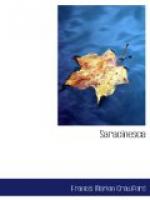While Del Ferice was thus making his way across the Campagna, Temistocle was taking measures for his own advantage and safety. He had the bag with his master’s clothes, the valuable watch and chain, and the pearl studs. He had also the key to Del Ferice’s lodgings, of which he promised himself to make some use, as soon as he should be sure that the detectives had left the house. In the first place he made up his mind to leave Donna Tullia in ignorance of his master’s sudden departure. There was nothing to be gained by telling her the news, for she would probably in her rash way go to Del Ferice’s house herself, as she had done once before, and on finding he was actually gone she would take charge of his effects, whereby Temistocle would be the loser. As he walked briskly away from the ruinous district near the Porta Maggiore, and began to see the lights of the city gleaming before him, his courage rose in his breast. He remembered how easily he had eluded the detectives an hour and a half before, and he determined to cheat them again.
But he had reckoned unwisely. Before he had been gone ten minutes the two men suspected, from the prolonged silence, that something was wrong, and after searching the lodging perceived that the polite servant who had offered them coffee had left the house without taking leave. One of the two immediately drove to the house of his chief and asked for instructions. The order to arrest the servant if he appeared again came back at once. The consequence was that when Temistocle boldly opened the door with a ready framed excuse for his absence, he was suddenly pinioned by four strong arms, dragged into the sitting-room, and told to hold his tongue in the name of the law. And that is the last that was heard of Temistocle for some time. But when the day dawned the men knew that Del Ferice had escaped them.
The affair had not been well managed. The Cardinal was a good detective, but a bad policeman. In his haste he had made the mistake of ordering Del Ferice to be arrested instantly and in his lodgings. Had the statesman simply told the chief of police to secure Ugo as soon as possible without any scandal, he could not have escaped. But the officer interpreted the Cardinal’s note to mean that Del Ferice was actually at his lodgings when the order was given. The Cardinal was supposed to be omniscient by his subordinates, and no one ever thought of giving any interpretation not perfectly literal to his commands. Of course the Cardinal was at once informed, and telegrams and mounted detectives were dispatched in all directions. But Del Ferice’s disguise was good, and when just after sunrise a gendarme galloped into Tivoli, he did not suspect that the travel-stained and pale-faced friar, who stood telling his beads before the shrine just outside the Roman gate, was the political delinquent whom he was sent to overtake.




